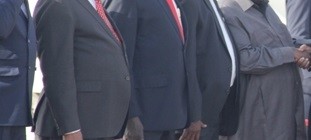A small number of “privileged people close to the ruling circles” in South Sudan are benefiting from the country’s collapsing currency and shortage of dollars, according to a recently published independent report. These individuals access dollars from the Central Bank at a rate of about 3:1 and then sell them for pounds at a rate of about 9:1.
Because these politically influential individuals are profiting from the difference between the official rate and the street rate, the government is reluctant to alter the official rate, which would ease the dollar shortage and in turn drive down consumer prices.
This was reported by the European Union after a meeting between the International Monetary Fund (IMF) and Finance Minister-designate David Deng Athorbei and President Salva Kiir in late March, according to the independent Indian Ocean Newsletter.
The IMF delegation found that “the gap between the official exchange rate… and the ‘street’ rate… benefits a small number of priveleged people close to the ruling circles,” the Newsletter reported, citing the IMF and an European Union internal memo on the matter dated 30 March. “They exchange their dollars on the black market and then sell the SSP to the Central Bank at the official rate, pocketing the difference.”
South Sudan’s central bank normally makes dollars available to commercial banks and foreign exchange dealers by taking South Sudanese pounds from them and giving them dollars in return. In turn, these financial institutions are meant to make dollars available at authorized rates to businesses, individuals and organizations.
However, these days many foreign exchange bureaus and banks do not have enough dollars to meet consumer demand. Some importers such as water bottling companies have shut down as a result of the dollar shortage.
A trader who spoke to Radio Tamazuj last month suggested that the Central Bank is selling dollars to national companies that in turn trade them at the black market rate for a profit. Other sources suggested the Bank’s reserves were running low and that therefore it could not make enough dollars available.
Currency traders meanwhile are more reluctant to trade South Sudanese pounds at authorized rates because of the declining street value of the currency. The Central Bank has been printing South Sudanese pounds to cover government spending deficits, Radio Tamazuj reported last month. This means that there are more pounds in circulation and each pound has less value than before.
In spite of these developments, Kiir and Athorbei are “in no hurry to unify the official and parallel exchange rates,” the Newsletter reported, citing the IMF. Meanwhile, according to figures obtained by the IMF from the finance ministry, South Sudan’s government is devoting 70% of its expenditure to security, an amount of about $210 million a month.
Related:
IMF: South Sudan currency policy enables ‘hidden transfer of resources’ (3 May)




